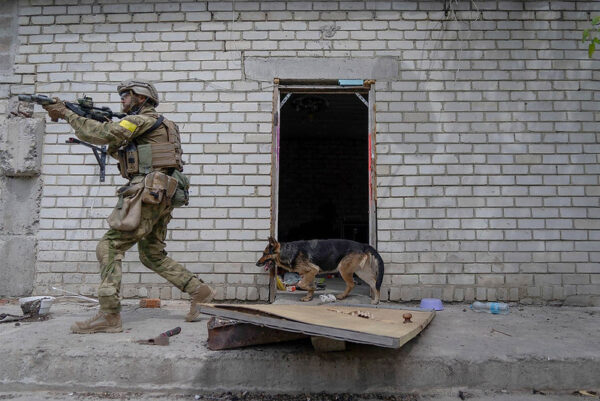
An American Veteran serving in the Ukrainian Armed Forces (Photo: manhhai)
American Veterans serving as advisors, combatants, and in support roles in foreign wars without approval from the U.S. Government is not new — but it is increasing in frequency.
The War in Ukraine
In early 2022, forces of the Russian Federation invaded neighboring Ukraine to spark a conflict that has largely devolved into a stalemate reminiscent of World War I, but with high-tech drones, cruise missiles, and long-range rocket artillery exhibiting contemporary methods of killing.
Touted as a “special military operation” by Russian leadership to eliminate alleged extremist groups within Ukraine, the Russian war machine seemingly failed to achieve much more than what eastern Ukrainian separatist groups had already garnered since the initial conflict began in 2014. Much publicized offensives and counter-offensives have occasionally shifted frontlines and Russia has, to date, abandoned any real attempt to capture Ukraine’s capital of Kyiv.
Commonly accepted casualty numbers suggest that the Russian Federation has lost over 300,000 troops while Ukraine’s losses are thought to be closer to 200,000. A big reason for Ukraine’s continued survival? The United States and NATO have funneled tens of billions of dollars’ worth of weapons and supplies into Ukraine, along with detailed intelligence about Russian troop movements, capabilities, and supply issues.
Moreover, the United States has unofficially allowed dozens — if not hundreds or thousands — of American Veterans to directly join the conflict in both humanitarian and combat roles, with most joining the Ukrainian Foreign Legion, a nongovernmental organization that works closely with Ukrainian Intelligence, and a select few enlisting in the Ukrainian Military.
The exact nature of these roles is often unclear, but there is significant evidence that many Americans are still fighting on the frontlines in Ukraine. And some are not returning home. In July, The California Legionnaire reported on the passing of Ian “Frank” Tortorici of Lake Forest, California, who was killed by a Russian collaborator while off-duty. Prior to his murder, Tortorici had served at the front for over a year. Tortorici’s reason for joining the war effort? He saw Russia’s invasion as a precursor to World War III and wanted to do his part to prevent an escalation.
The new conflict between Israel and Gaza
Some reasons for American Veterans putting boots on the ground in foreign conflict zones are more immediate. When Hamas launched an all-out assault on Israeli civilians and military checkpoints, Israel effectively prevented entry and exit to Gaza, trapping thousands of American citizens in the besieged territory.
Right away, two American Veterans groups traveled to Israel to help evacuate Americans amidst constant air strikes and bombardments in coordination with the U.S. State Department. It is currently unclear how many, if any Americans remain trapped in Israel or the Palestinian territories. Meanwhile, the conflict — currently suspended by a ceasefire that is set to expire imminently — threatens to expand as Israel continues an urban ground offensive and neighboring countries, including Iran, threaten retaliation.
More conflicts around the world
Fighting old rivals and providing humanitarian assistance are not the only reasons that American Veterans have joined foreign conflicts in recent years. American Veterans, including high-ranking officers such as Gen. Jim Mattis, have been assisting the United Arab Emirates in both advisory and combat roles as the country exerts a growing military influence in both nearby Yemen and Libya, far to the west.
This relationship, however, has not occurred on humanitarian or ideological grounds, but for direct compensation.
Is it legal for American Veterans to join foreign wars and conflicts?
Regardless of the reason American Veterans are joining foreign conflicts, the phenomenon does raise a question: is it legal?
Muddy federal law supposedly restricts current and prior American Service Members from serving foreign entities without express approval from both the Pentagon and State Department (and possibly Congress). Whether approval is occurring — or if serving in foreign militaries is actually illegal — has largely remained unclear, and possibly unenforced.
The Veterans working in Israel to evacuate American citizens are, again, doing so in collaboration with the State Department. However, in both Ukraine and the UAE, this is much less clear. The purpose of the aforementioned laws is to ensure that Veterans are not actively working against American interests.
Likewise, the United States has been nothing but vocal about its support for Ukraine, and has labeled the Houthi rebels that the UAE is fighting a terror organization. Nevertheless, the State Department has maintained a policy of discouraging Veterans from joining the Ukrainian war effort, but with the only apparent consequence being that the U.S. Government cannot rescue or assist Americans operating in Ukraine or Russia should they be captured, wounded, or killed. As for the conflicts the UAE has been participating in, the State Department has largely remained silent.
Whether American Veterans joining foreign conflicts speaks to the increasing number of high-profile conflicts in the world or highlights domestic issues — such as difficulty transitioning from military to civilian life or ensuring financial stability post-service — is ultimately difficult to say. But as these occurrences continue, they are likely to draw the eyes of policymakers.













